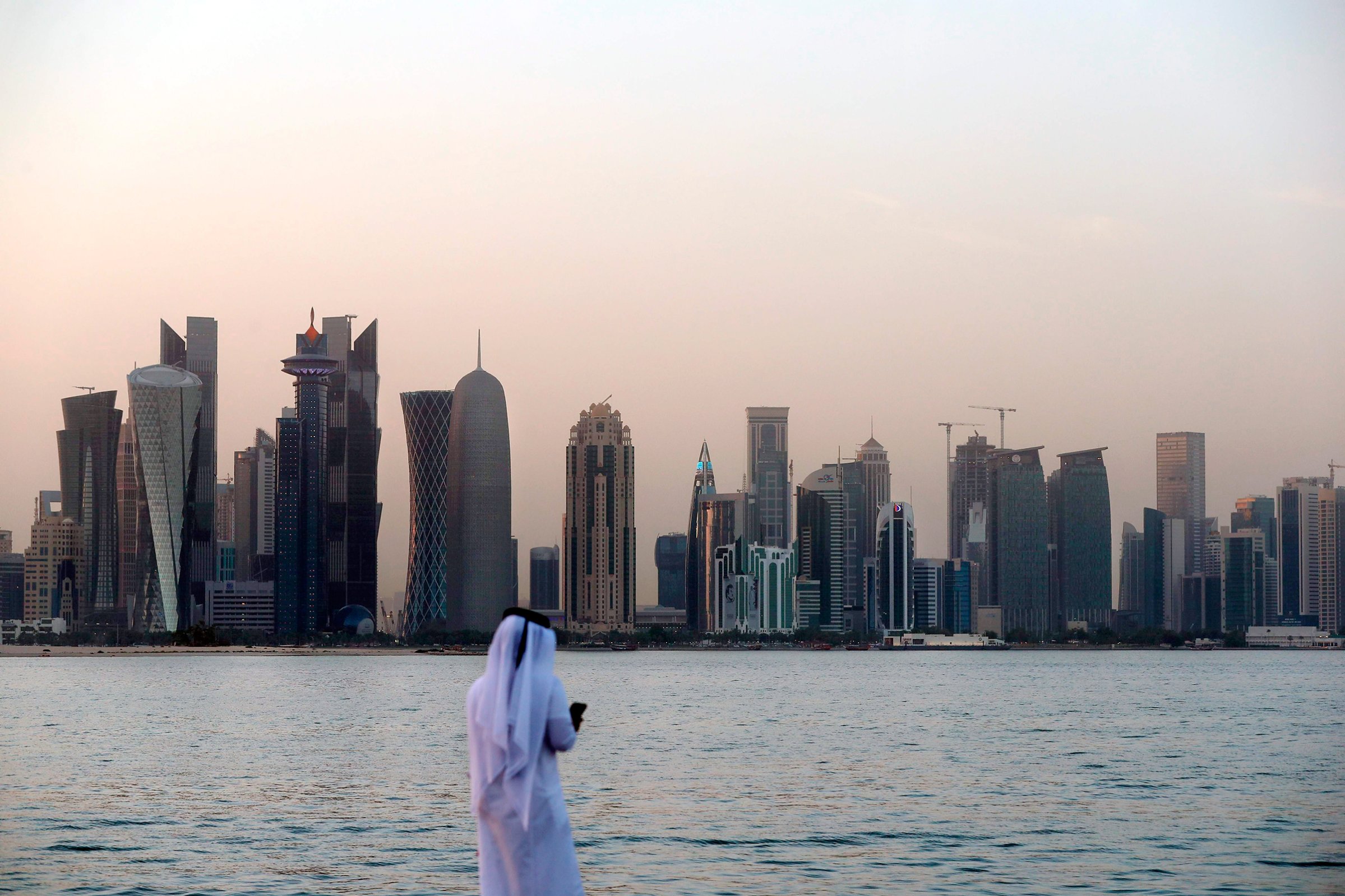
In a sprawling farm complex in the desert north of Doha, more than 300 cows occupy a warehouse, munching on piles of grass. In one pen sits a group of newborn calves, gangly legs folded, ears twitching. The cows make no sound at all, apart from a gentle rustling.
These Holsteins are here because of a geopolitical crisis in the Middle East. After Saudi Arabia, the United Arab Emirates, Bahrain and Egypt imposed heavy sanctions on Qatar on June 5, a Qatari company launched an airlift of hundreds of cows to safeguard milk supplies, since an embargo cut into dairy imports. “My instructions were we needed cows yesterday,” says John Joseph Dore, a 57-year-old Irishman and the CEO of Baladna, the farm where the cows now reside. Wearing a straw hat and a sky blue shirt, Dore says plans are in place to import 14,000 more dairy cows from as far away as Wisconsin and California by 2018. “Lots of people said we couldn’t do it, but we did do it,” he says.
More than seven weeks in, the crisis between Qatar and its neighbors has settled into a stalemate. The “gang of four” nations led by Saudi Arabia and the UAE has accused Qatar of supporting extremist groups across the region, a charge the Qataris vehemently deny. On June 23, the blockading states issued a list of 13 demands, urging Qatar to sever ties with Iran and the Muslim Brotherhood and shut down its controversial but popular news network al-Jazeera.
Qatar stood firm. One of the world’s largest exporters of natural gas, the nation is both tiny and rich, with fewer citizens than the city of Tulsa, Okla. It is also home to the largest U.S. military base in the Middle East, a key location for launching air assaults on ISIS and al-Qaeda. The country’s government and businesses quickly found ways to circumvent the blockade, establishing alternative shipping routes and flying in livestock. Supermarket shelves emptied in the wake of the initial embargo were restocked within days.
The Qataris are far from totally isolated; the peninsula has received support from Europe, regional powers like Turkey and the top U.S. diplomat, Secretary of State Rex Tillerson. On July 21, Tillerson said he was “satisfied” with Qatar’s efforts to combat the financing of terrorist networks. President Trump, who has rebuilt U.S. relations with the Saudis, created confusion when he tweeted support for the campaign against Qatar on June 6, but he has since fallen silent on the issue.
The Saudi and UAE–led bloc has now reshaped its demands into six broad principles, including a vague call for Qatar to combat extremism and terrorism. Qatari officials insist they are already doing just that and show no sign of conceding. The Saudis and their allies “overestimated the level of international support they’d get, and we’re confident that the world sees that this blockade is an unreasonable violation of our sovereignty,” says Sheikh Saif bin Ahmed al Thani, a Qatari government spokesman. “The blockading countries are looking for a way out of this. They’ll need to negotiate a deal that ends the crisis without embarrassing themselves.”
However, the Saudi, Emirati, Bahraini and Egyptian governments are showing few signs that they will drop the sanctions anytime soon. On July 25, Egypt’s Foreign Minister Sameh Shoukry rejected “any form of negotiations” with Qatar. The UAE’s Foreign Finister Anwar al-Gargash predicted “a long estrangement.” Mohammed Alyahya, a Saudi political analyst with the Atlantic Council in Washington, says, “The Qataris do not properly appreciate the gravity of the situation and the depth of the quartet’s grievances, especially Saudi Arabia’s.”
This crisis has deep roots among the Saudis in long-simmering differences over Qatar’s sympathy and aid for Islamist groups in the region, Qatar’s perceived support for the 2011 Arab Spring uprisings and Qatar’s “open door” policy of warm relations with countries like Iran, the archrival of Saudi Arabia. This diplomatic standoff has been a long time coming, and will not be resolved quickly. It’s the Gulf’s version of the Cold War–and it has only just begun.
More Must-Reads from TIME
- Why Trump’s Message Worked on Latino Men
- What Trump’s Win Could Mean for Housing
- The 100 Must-Read Books of 2024
- Sleep Doctors Share the 1 Tip That’s Changed Their Lives
- Column: Let’s Bring Back Romance
- What It’s Like to Have Long COVID As a Kid
- FX’s Say Nothing Is the Must-Watch Political Thriller of 2024
- Merle Bombardieri Is Helping People Make the Baby Decision
Contact us at letters@time.com